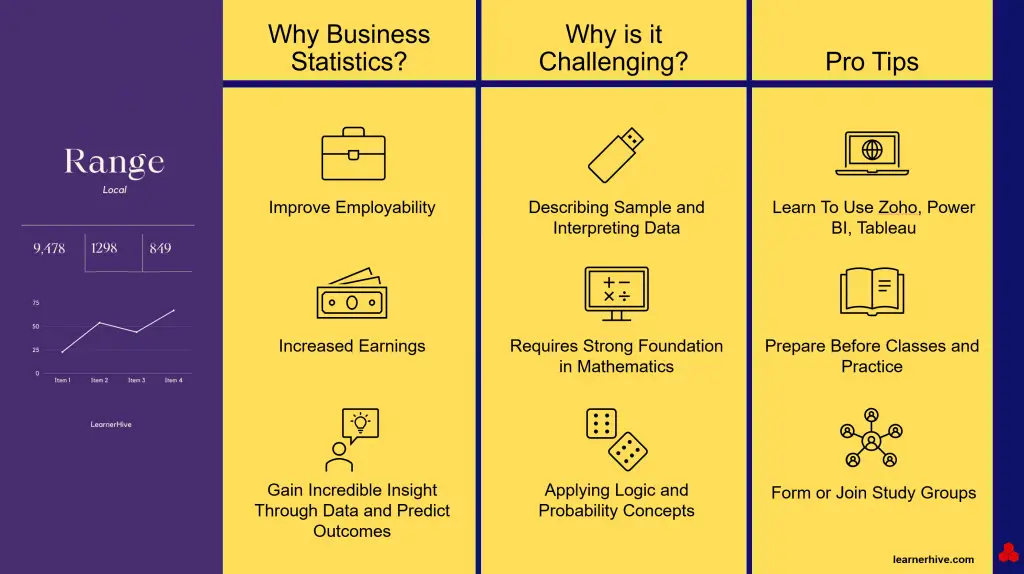Research has shown that business statistics is one of the most challenging subjects in any degree program.
But do not worry. By studying Business Statistics, we can gain a deeper understanding of the subject along the way. So take these incredible pieces of advice on how to learn effectively!
Is Business Statistics Hard?
Business Statistics is hard because it’s all about math and data. In other words, there is a deeper level of analysis than simply knowing how to add and subtract numbers. Additionally, mastering mathematical fundamentals requires a deeper understanding of what those numbers represent, what they mean, and how to use them in different situations! However, learning this course increases your earning potential and is generally fulfilling.
Let’s identify why Business Statistics is a challenging yet rewarding course to take, so tune in!
1. Business Statistics is all About Data
Business Statistics can be hard because it requires you to learn all about data and how to analyze the data.
For example, if you’re analyzing sales figures for your business, there will probably be different types of sales that you need to account for and compare.
For example, this course requires working with variables created by combining specific values.
Overall, students need to be comfortable with the idea that they will be dealing with numbers and graphs. Although challenging, this data management is beneficial and attainable!
2. Deeper Level of Analysis
When students start taking business statistics, they quickly realize how much harder it is than other classes in their major, especially statistical analysis concepts.
Moreover, the statistical analysis applies specific numerical approaches to a sample of data to understand the entire population.
However, this field is complicated because it covers various topics—from financial analysis and operations management to quality control and forecasting techniques.
Undeniably, the subject matter itself is valuable. It’s a worthy pursuit for newcomers who want to understand how businesses operate!

3. Understanding Mathematical Fundamentals
Since statistics is a branch of mathematics, having solid mathematical foundations is necessary to understand statistics.
Therefore, when there is an economic exchange, it is essential to understand the fundamentals of computation.
Along with this, students need to understand the structure of their business and how it interacts with other companies and the economy as a whole.
Due to this, the best way to learn business statistics is by taking it seriously. Students who persevere will appreciate it and be well-prepared for their future economic careers!
4. Business Statistics Requires Logical Analysis
Another skill newcomers need to comprehend in the statistics field is logical data analysis.
As you can see, the analytical study is perfect for all of these situations because it lets you look at what’s happening in your business objectively and logically instead of emotionally or intuitively.
As a matter of fact, the skills you’ll learn are not just for business, but life. For example, trainees can conclude data, whether that means running a business or managing their finances.
As an effect, students should never get discouraged because there’s no better way to learn than by challenging yourself. It is hard, but it’s worth it!
5. Statistical Problem-Solving
Statistical problem-solving help the students to master several complex skills with methods like standard deviation, regression, hypothesis testing, and sample size determination.
In most cases, businesses use this information to make strategic decisions about their products, services, pricing strategies, and other activities that affect their bottom line.
Consequently, these techniques will improve the student’s judgments regarding future company operations in light of best decision-making practices!
6. Learning Arithmetic Formulas

You might think it’s a breeze—all you have to do is memorize some formulas, and you’ll be good to go! But that’s not the case.
On the other hand, business statistics involves arithmetic formulas, which can be challenging even for those who have majored in math in school.
In addition, arithmetic computations are used to compute the correlation coefficient, standard deviation, and average concepts.
Although it takes time and effort to learn these formulas, for students who are willing to put in the time and effort, this course will serve as a worthy study option!
Learn more: Is Mathematics hard?
7. Business Statistics Needs Understanding of Economics
Do you remember when you were little, and your mom made you learn multiplication and division so that you could make changes for a dollar bill?
Or when you thought that adding was easy until algebra came along? Business Statistics is like that—it’s about economics and how money works.
At this point, students can apply what they’ve learned to their job by analyzing data on sales or profits, or costs of goods sold (COGS).
After all, juniors who want to enter the world of economics can help their future companies achieve success in trading and eCommerce production!
8. Probability Concepts in Business Statistics
A primary function of probability is to facilitate better decision-making under uncertain conditions.
In other words, statistical ideas are used to calculate the likelihood of certain events occurring.
Of course, it requires a solid grasp of basic math concepts, but newbies can build a solid foundation by studying business statistics with the right approach.
Therefore, students will adapt perceptions by building simulations that let them test their hypotheses. It’s a subject with so many opportunities for learning and discovery!
9. Reasoning and Data Interpretation Skills
Another reason business statistics is problematic is that it requires students to use their reasoning skills to come up with an answer.
Along with this, the first step in studying business statistics is understanding the difference between deductive, inductive, and abductive approaches.
Moreover, the next step is to learn about the different types of statistical tests: hypothesis testing, correlation analysis, and chi-square tests.
Although the material is complex at first thought, juniors can practice their critical reasoning with an open-minded approach and willingness to learn!
10. Requires a lot More Memorization
It’s not just because of the subject matter and the work it takes to excel in this field but also because it requires considerable memorization.
Apart from this, students have to know how to calculate averages and standard deviations and all the terminology that goes along with each concept.
Without a doubt, anyone who’s studied Business Statistics will tell you that it’s not always easy. But it’s essential for education.
Generally, it fuels innovation and new ideas and makes students realize their potential. Therefore, we believe that Statistics is something worth studying!
11. Learning a New Language
Statistics could be complicated at first, but learning a new language is the same way.
Additionally, once the fundamentals are grasped and practiced, they become much more accessible and eventually become second nature.
Because of that, solving statistical questions is not difficult once a student is aware of the analytical procedures needed.
Above all, the advantages of mastering this analysis in high school or college can help a student position themselves for success in their everyday lives!
To learn more, you can also see our posts on Accounting, Advertising, Digital Marketing, Business Law, Computer Science, Data Analytics, and Interior Design.
Conclusion
Business Statistics is hard. And I’m not going to sugarcoat it. It is quite a challenge because it takes much more work to major in this subject.
As demonstrated, it could be difficult for students to comprehend statistics because it involves a lot of data, in-depth analysis, and mathematical principles.
Ultimately, Statistics it’s fundamental for education, which encourages creativity and interest among students. And it’s still fun—beginners can work hard and get recognized with a rewarding subject!

